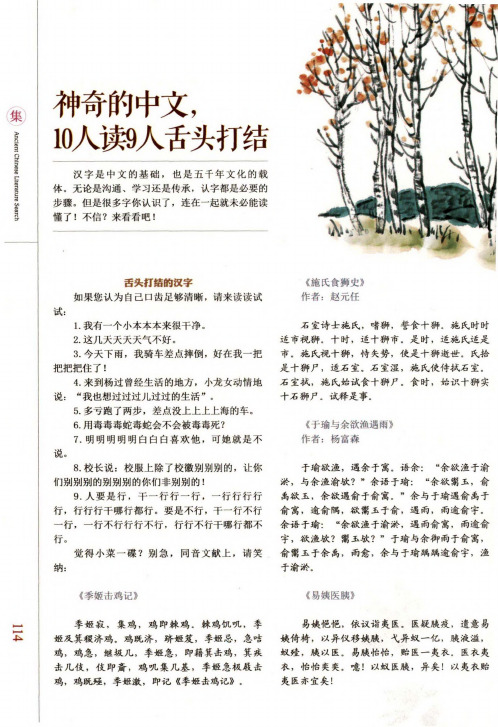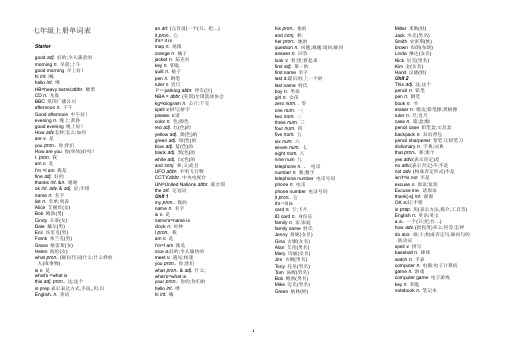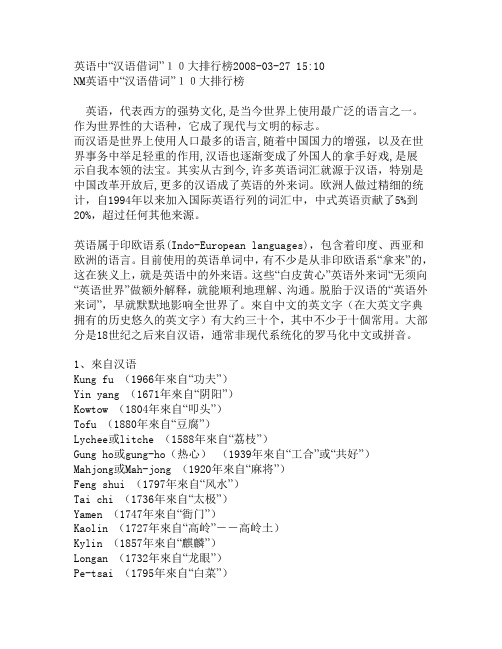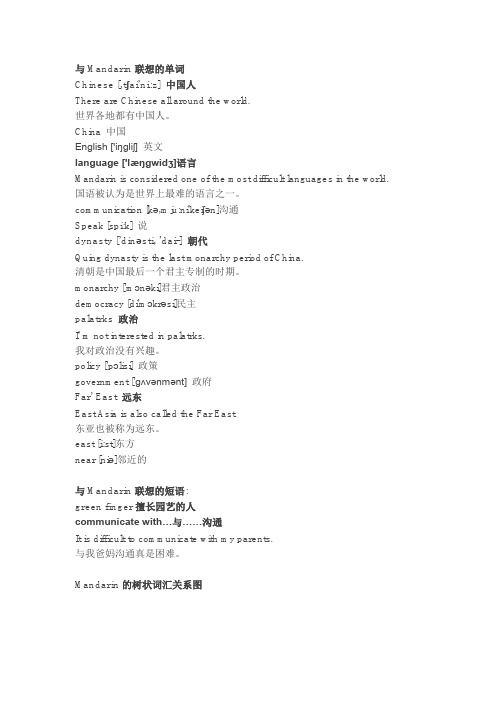咽-9999-多米尼克人学汉语Chinese-English dictionary
- 格式:doc
- 大小:24.00 KB
- 文档页数:1


七年级上册单词表Startergood adj.好的;令人满意的morning n.早晨;上午good morning 早上好!hi int.;嗨hello int.喂HB=heavy barrel;abbr.硬黑CD n.光盘BBC 英国广播公司afternoon n.下午Good afternoon 中午好!evening n.晚上;黄昏good evening 晚上好!How adv.怎样;怎么;如何are v.是you pron..你;你们How are you 你(身体)好吗?I. pron.我am v.是I'm =I am 我是fine adj.好的thanks int. &n.谢谢ok int.adv. & adj.好;不错name n.名字list n.名单;列表Alice 艾丽丝(女)Bob 鲍勃(男)Cindy 辛蒂(女)Dale 戴尔(男)Eric 埃里克(男)Frank 弗兰克(男)Grace 格雷斯(女)Helen 海伦(女)what pron.. (疑问代词)什么;什么样的人(或事物)is v.是what's =what isthis adj.pron..这;这个in prep表示表达方式,手段,,用,以English. n.英语an art. (元音前)一个(只,把…)it pron..它it's= it ismap n.地图orange n.橘子jacket n.茄克衫key n.钥匙quilt n.被子pen n.钢笔ruler n 直尺P=parking abbr.停车(区)NBA = abbr. (美国)全国篮球协会kg=kilogram n. 公斤;千克spell v.拼写;拼字please. v.请color n.色;颜色red adj.红(色)的yellow adj.黄(色)的green adj.绿(色)的blue adj.蓝(色)的black adj.黑(色)的white adj.白(色)的and conj. 和;又;而且UFO abbr.不明飞行物CCT V.abbr.中央电视台UN=United Nations abbr.联合国the art.定冠词Unit 1my pron..我的name n.名字is v.是name's=name isclock n.时钟I pron..我am v.是I'm=I am 我是nice a.好的;令人愉快的meet v.遇见;相逢you pron..你;你们what pron.. & adj.什么;what's=what isyour pron..你的;你们的hello int.喂hi int.嗨his pron..他的and conj. 和;her pron..她的question n.问题;难题;询问;疑问answer n.回答look v.看;望;看起来first adj.第一的first name 名字last a.最后的;上一个的last name 姓氏boy n.男孩girl n.女孩zero num. . 零one num.一;two num.二three num.三four num.四five num.五six num.六seven num.七eight num.八nine num 九telephone n.,电话number n.数;数字telephone number 电话号码phone n.电话phone number 电话号码it pron..它it's=It iscard n.卡;卡片ID card n.身份证family n.家;家庭family name 姓氏Jenny 詹妮(女名)Gina 吉娜(女名)Alan 艾伦(男名)Mary 玛丽(女名)Jim 吉姆(男名)Tony 托尼(男名)Tom 汤姆(男名)Bob 鲍勃(男名)Mike 迈克(男名)Green 格林(姓)Miller 米勒(姓)Jack 杰克(男名)Smith 史密斯(姓)brown 布朗(布朗)Linda 琳达(女名)Nick 尼克(男名)Kim 金(女名)Hand 汉德(姓)Unit 2This adj.这;这个pencil n.铅笔pen n.钢笔book n.书eraser n.橡皮;铅笔擦;黑板擦ruler n.尺;直尺case n.箱;盒;橱pencil case 铅笔盒;文具盒backpack n.双肩背包pencil sharpener 卷笔刀;铅笔刀dictionary n.字典;词典that pron..那;那个yes adv.(表示肯定)是no adv.(表示否定)不;不是not adv. (构成否定形式)不是isn't=is not 不是excuse v.原谅;宽恕Excuse me. 请原谅thank[-s] int.谢谢OK a.好;不错in prep.用(表示方法,媒介,工具等)English n.英语;英文a a.. 一个(只;把;台…)how adv. (指程度)多么;何等;怎样do aux.做;干;构成否定句,疑问句的助动词spell v.拼写baseball n.棒球watch n.手表computer n.电脑;电子计算机game n.游戏computer game 电子游戏key n.钥匙notebook n.笔记本ring n.环;戒指call v.打电话at prep.在…里面或附近;在…(点,刻);以in prep.在…里面the adv.表示特指的人,物或群体lost v. 遗失found v.找回lost and found 失物招领处please v.请school n.学校a set of 一套;一台of prep. (所属)…的Tim 蒂姆(男名)Sonia 索尼娅(女名)Jane 简(女名)Kelsey凯思(女名)David大卫(男名)Unit 3sister n.姐;妹mother a.妈妈;母亲father n.爸爸,父亲parent n.父亲或母亲brother n.兄,弟grandmother n.祖母;外祖母grandfather n.祖父,外祖父friend n.朋友grandparents n.祖父母;外祖父母those pron..adj.那些are v.是that's= that isthese 这些she pron.. & adj.她he pron..他he's=he isaunt n.伯母;姑;婶;姨son n.儿子cousin n.堂(表)兄弟(姐妹) daughter n.女儿uncle n.叔;伯;姑父;舅;姨父picture n.照片;图画dear adj. (冠于信函中的称谓)亲爱的; for prep 这了thanks for 为…而感谢photo n.照片;相片here adv.这里;在这里Dave 戴夫(男名)Anna 安娜(女名)Paul 保罗(男名)Emma 艾玛(女名)Mona 莫娜(女名)Unit 4where adv.在哪里where's=where istable n.桌子bed n.床dresser n.梳妆台bookcase n.书橱;书柜sofa n.沙发chair n.椅子drawer n.抽屉plant n.植物under prep.在…下they pron..他(她,它)们they're=they are 他们是on prep.在…之上don't=do notknow v.知道;了解bag n.书包,提包;带子math n.数学alarm clock n 闹钟CD n.光盘video n 录像,视频tape n.录音带hat n.帽子take v.拿走;带到thing n.东西;物to prep. (表示方向)朝;向;至;达mom n. (非正式用语)妈妈can v.能;可以;会bring v.拿来;取来;带来some adj. & pron..一些;若干need v.需要floor n.地板;地板;地面room 房间T V.n.电视;电视机desk n.书桌;课桌Tommy 汤米(男名)Sally 萨莉(女名)Unit 5have v.有soccer n.英式足球ball n.球soccer ball 英式足球tennis n.网球racket n. (网球,羽毛球的)球拍tennis racket 网球拍ping-pong n.乒乓球volleyball n.排球basketball n.篮球bat n. (乒乓球的)球拍does v. Do的第三人称单数doesn't=does notlet v.允许,让us we的宾格let's=let us 让我们play v.玩,打(球)well n.喔等(用来引出一句话)sound v.听起来good adj.良好的;令人满意的sport n.运动we pron..我们many adj.大量的club n.社团;俱乐部more pron..更多的;更大的class n.班级;(一节)课interesting a.有趣的;令人感兴趣的boring a.无聊的;令人生厌的fun adj.有趣的;令人愉快的difficult a.困难的relaxing a.轻松的watch n.观看;注视watch T V看电视has v. (Have的第三人称单数形式)great a.美妙的;大的collection n.收藏品;收集物but conj. 但是play sports 参加体育运动或比赛only adv.只;仅仅them pron.. they的宾格every a.每一;每个day n.天;日间;白天;一日Peter 彼得(男名)Barry 巴里(男名)Ed 埃德(男名)Hall 霍尔(姓)Unit 6like v.喜欢banana n.香蕉hamburger n.汉堡包tomato n.西红柿broccoli n.花椰菜French fries 炸马铃薯条;薯条orange n.橙子ice n.冰cream n.奶油;乳脂ice cream n.冰淇淋salad n.沙拉strawberry n.草莓pear n.梨have aux.吃;饮oh int.啊;呀;哦countable noun 可数名词uncountable noun 不可数名词food n.食物egg n.鸡蛋apple n.苹果carrot n.胡萝卜chicken n.鸡;鸡肉breakfast n.早餐lunch n.午餐dinner n.晚餐;正餐fruit n.水果vegetable n.蔬菜;植物runner n.奔跑者eat v.吃well adv.好,对,满意地run v.跑,奔跑star n.星星;明星lot adv.许多lots of 大量;许多…healthy a.健康的;强健的dessert n. (饭后的)甜食list n.清单Bill 比尔(男名)Sandra 桑德拉(女名)Clark 克拉克(姓)Review of units 1-6furniture n.家具(总称)people n.人;人民an art.一个(只;把;台…)blank n.空白conversation n.交谈;谈话other a.另外的人(物)also adv.也;亦;并且Joe 乔(男名)Unit 7how much (价钱)多少pants n.裤子sock n.短袜shirt n.男衬衣;衬衫t-shirt n. T恤衫shorts n 短裤sweater n.毛衣shoe n.鞋skirt n.裙子sale n.出售;廉价销售dollar n.元(美国,加拿大货币)color n.色;颜色black adj. n.黑色(的)white adj. n.白色(的)red adj. n.红色(的)green a.绿色(的)blue adj.n.蓝色(的)yellow adj.n.黄色(的)big a.广大的;重大的small a.小的;小号的short a.短的;矮的long a.长的clerk n. (银行,办公室,商店等的)职员;办事员help n.帮助;援助want n.需要;想要Here you are. 给你。

英语中“汉语借词”10大排行榜2008-03-27 15:10NM英语中“汉语借词”10大排行榜英语,代表西方的强势文化,是当今世界上使用最广泛的语言之一。
作为世界性的大语种,它成了现代与文明的标志。
而汉语是世界上使用人口最多的语言,随着中国国力的增强,以及在世界事务中举足轻重的作用,汉语也逐渐变成了外国人的拿手好戏,是展示自我本领的法宝。
其实从古到今,许多英语词汇就源于汉语,特别是中国改革开放后,更多的汉语成了英语的外来词。
欧洲人做过精细的统计,自1994年以来加入国际英语行列的词汇中,中式英语贡献了5%到20%,超过任何其他来源。
英语属于印欧语系(Indo-European languages),包含着印度、西亚和欧洲的语言。
目前使用的英语单词中,有不少是从非印欧语系“拿来”的,这在狭义上,就是英语中的外来语。
这些“白皮黄心”英语外来词“无须向“英语世界”做额外解释,就能顺利地理解、沟通。
脱胎于汉语的“英语外来词”,早就默默地影响全世界了。
來自中文的英文字(在大英文字典拥有的历史悠久的英文字)有大约三十个,其中不少于十個常用。
大部分是18世纪之后来自汉语,通常非现代系统化的罗马化中文或拼音。
1、來自汉语Kung fu (1966年來自“功夫”)Yin yang (1671年來自“阴阳”)Kowtow (1804年來自“叩头”)Tofu (1880年來自“豆腐”)Lychee或litche (1588年來自“荔枝”)Gung ho或gung-ho(热心)(1939年來自“工合”或“共好”)Mahjong或Mah-jong (1920年來自“麻将”)Feng shui (1797年來自“风水”)Tai chi (1736年來自“太极”)Yamen (1747年來自“衙门”)Kaolin (1727年來自“高岭”--高岭土)Kylin (1857年來自“麒麟”)Longan (1732年來自“龙眼”)Pe-tsai (1795年來自“白菜”)Petuntse (1727年來自“白墩子”)Sampan (1620年來自“舢板”)Suan-pan (1736年來自“算盘”)Tao (1736年來自“道”)Taipan(大商行的总经理)(1834年來自“大班”)Toumingdu(透明度)(來自1980年代中英谈判期间用語“透明度”)Typhoon (來自“台风”)Tuchun (1917年來自“督军”)Tung(油桐属)(1788年來自“桐”)Ho-ho bird (1901年來自“凤凰”)Wampee(一种果)(1830年來自“黄皮”)Whangee(一种竹)(1790年來自“黄藜”)Mandarin(官話)(來自“满大人(中国清朝的官吏)”)现在指汉语Qi Bo (來自“情报”)2、來自粵語英语在香港比较普及,加上从前香港通常比内地较先接触外来的新事物,过去不谙英语的低下阶层会用广州话拼读日常的英语词汇,所以香港粤语的英语外来词十分普遍.例如“地盘管工”叫“科文”(foreman)、“煞车”叫“逼力”(brake)、“轴承”叫“啤令”(bearing)、“草莓”叫“士多啤梨”(strawberry)等等.不少老人家仍把“邮票”称作“士担”(stamp)、“保险”叫“燕梳”(insurance)等.这些道地的用语可能会使外地汉语使用者不知所云.改革开放后,广东成为经济和文化交流的前沿阵地,粤语在英语中渗透发展。

多米尼克记忆法体系中文记忆法年龄越大记性越差?如果你正在如此抱怨自己,那么,请让世界首席记忆大师多米尼克告诉你:事实并非如此,人的记忆潜能是没有极限的,年龄代表的是经验,而不是健忘!多米尼克记忆法体系有哪些的呢?本文是小编整理多米尼克记忆法体系的资料,仅供参考。
多米尼克其人多米尼克•奥布莱恩,世界上最令人赞叹的记忆天才。
1991年,奥布莱恩初出茅庐,凭借着自己独创的“多米尼克系统”,在当时的首届世界记忆锦标赛上扫尽强敌,成为当年的记忆冠军,并创下新的世界记录。
此后11年间,奥布莱恩8次卫冕成功,稳居冠军宝座。
他可以用38秒记住一副扑克牌的顺序,用30分钟记住2385个随机产生的数字,用1个小时记住元素周期表上110种元素的原子序数、元素符号、元素类别和精确到4位小数的原子量……他因为记性太好而被各国的赌场拒之门外,现在不仅英国所有的赌场都不欢迎他,就算在法国、捷克、美国等国的赌场,也都盯上了他,不让他入场。
记忆训练的鼻祖托尼•布赞称其拥有一颗“人类迄今为止发展开发得最为深入的大脑”多米尼克其法:我们先来看看一般记忆法的内容,然后,然后来说说多米同志的法门的特殊性。
一般市面常见的记忆法,大概会有这么几个步骤,我在偶的“林式记忆”中作了归纳:电影记忆法——在这里,你是导演,同时,你可以是演员。
可以在你的记忆故事给自己留一个角色。
技巧1、串联法[也叫情节法]把你要记忆的知识点串在一起,编成一段故事。
这就是一段“电影情节了”。
技巧2、转化法[也叫演员法]有一些知识比较抽象,需要转化成比较容易记的图像来记忆。
这就需要转化了。
电影总是需要演员的,而在电影记忆法里的演员,就是从知识点转化过来图像了。
技巧3、挂钩法[也叫舞台法]如果知识点太多,你如果从头串到最头,容易断掉。
所以,需要用到地点挂钩法。
把知识点,分成若干分段,挂上挂钩上来记忆。
这些地点的挂钩,就是你的演员表演的舞台了。
技巧4、奇特法[也叫卖点法]串联或挂钩时,你需要对自己的想象进行夸张的、搞笑的、富于情感的、有声有色的处理。

与Mandarin联想的单词Chinese [,tʃai'ni:z] 中国人There are Chinese all around the world.世界各地都有中国人。
China 中国English ['iŋɡliʃ] 英文language ['læŋɡwidʒ]语言Mandarin is considered one of the most difficult languages in the world. 国语被认为是世界上最难的语言之一。
communication [kə,mju:ni'keiʃən]沟通Speak [spi:k] 说dynasty ['dinəsti, 'dai-] 朝代Quing dynasty is the last monarchy period of China.清朝是中国最后一个君主专制的时期。
monarchy ['mɔnəki]君主政治democracy [di'mɔkrəsi]民主palatrks 政治I' m not interested in palatrks.我对政治没有兴趣。
policy ['pɔlisi] 政策government ['ɡʌvənmənt] 政府Far' East 远东East Asia is also called the Far East.东亚也被称为远东。
east [i:st]东方near [niə]邻近的与Mandarin联想的短语:green finger擅长园艺的人communicate with…与……沟通It is difficult to communicate with my parents.与我爸妈沟通真是困难。
Mandarin的树状词汇关系图。

外国学中文考试卷一、基础知识(共30分)(一)看拼音写汉字(10分)1. wǒ men(______)2. zhōng guó(______)3. xué xiào(______)4. shū běn(______)5. lǎo shī(______)(二)给下列汉字选择正确的读音(10分)1. 好(hǎo hào)- 我很______(hǎo hào)奇中国文化。
- 他是一个______(hǎo hào)人。
2. 长(cháng zhǎng)- 这条河很______(cháng)。
- 我______(zhǎng)大了想当医生。
3. 中(zhōng zhòng)- 我在______(zhōng)国学习中文。
- 他打靶百发百______(zhòng)。
(三)写出下列汉字的笔画数(10分)1. 日(______)2. 山(______)3. 水(______)4. 马(______)5. 火(______)二、词语运用(共30分)(一)选择合适的词语填空(15分)1. 爸爸、妈妈和我(______)一家人。
(是、有)2. 我(______)学校里有很多朋友。
(在、从)3. 今天的天气(______)好。
(很、太)4. 他(______)一本书给我看。
(拿、带)5. 我们(______)唱歌,(______)跳舞。
(一边……一边……、有的……有的……)(二)根据解释写出相应的词语(15分)1. 每天,天天。
(______)2. 对人或事物有好感。
(______)3. 高大的山脉。
(______)4. 自己跟自己说话。
(______)5. 太阳出来的时候。
(______)三、句子练习(共30分)(一)把下列词语组成句子(10分)1. 我、中文、学习、在、学校。
______________________2. 朋友、我的、很多、有、中国。
精心整理Body Language in China 中国人的肢体语言 (2010-04-13 18:39:56)标签: chinese teacher in shanghai body language learning 分类: Learning.ChineseBody language is an important part of nonverbal communication and it is this stupid to also have they will be regarded they are showing off richness.According to Chinese tradition, people who are sitting have right to take charge of others: Monarch sits and officer stands; father sits and son stands; leader sits and employee stands and so on. So the younger give the old a seat to show respect. But in America and Britain, people who are in charge of othershave tendency to stand. They will make use of the height of space to indicate the high status.American’s informalness is famous. Teachers can sit on the platform or desk when they are teaching. And the students needn’t to sit straight. But in China, people are required to have a good manner.Inand softly In publicis not Or theirChinese pay less attention to their private space. It is crowded in China because of a large population. So Chinese have got used to it and they often show their understanding and tolerance.It is common to see youth of the same sex hold hands and hug in China. But in English speaking countries, it will be regarded homosexuality.In China, people will give chrysanthemum to the patient. But French people never do this. Because they think chrysanthemum is used in funerals.In many cultures, smiles are signs of happiness or friendliness, like America and China. We will find out others will return a smile to the person who is smiling at them but will turn away or stop talking with the person who arereallyfeel necksHeadone’s head often means disagreement or “No”. Applauding means appreciation or agreement and so on. If a person is hurt, he/she will cry to express painfulness. And we smile when are happy. Waving one’s hand means goodbye. Even some Chinese and English expressions and their meanings are totally same. For example, patting on the back means encouragement and appreciation.Pulling a long face indicates unhappiness and anger. Being all smile means happiness, standing with folded arms means indifference and so on. Nowadays, with the development of the world, people from different cultures communicate more and more often. We have more chance to exchange culture and economy. The expert, Mcluhan compare the world to “global village” toof haveworld has a east andAs anand。
各个国家及国人的英文汇总Revised on November 25, 2020China中国Chinese[ta'ni:z,-'ni:s]adj.中国的n.中国话,汉语,中文;中国人,华裔Russia俄国Russian['rn]adj.俄国的;俄罗斯的;俄语的n.俄国人;俄罗斯人;俄语Canada['knd]n.加拿大Canadian[.:k'nedjn]adj.加拿大人的;加拿大的;加拿大语言的;加拿大文化的n.加拿大人Japan日本Japanese日本人,日本国民,日语,日本的,日本人的,日语的。
Korea朝鲜;Korean.朝鲜人,朝鲜国民;朝鲜语adj.朝鲜的,朝鲜人的,朝鲜语的Corea[.:k:'rin][.:k'ri]n.韩国Corean[k:'rin]n.韩国人[语]adj.韩国人[语]的Germany德国;German adj.德国的;德国人/语的;德国文化的n.德国人;德语France法兰西,法国;French,法国人的,法语的Frenchman法国人Britain不列颠,英国British adj.不列颠的,英国的,英国人的;英国英语的n.(总称)英国人;英国英USA(.美利坚合众国(=UnitedStatesofAmerica);美国陆军(=UnitedStatesArmy);美国钢铁工人联合会(=UnitedSteelworkersofAmerica))American n.美国人,美洲人adj.美国的;美洲的asAmericanasapplepie地道美国式的Ireland n.爱尔兰(岛)Irish adj.爱尔兰的;爱尔兰人〔语,文化…〕的,n.爱尔兰人,爱尔兰语Holland,荷兰Dutch[dt]adj.荷兰人的;荷兰的;荷兰语的n.荷兰语;荷兰人。
Dutchcourage酒后之勇goDutch(withsb)各付各的账;平摊费用;实行AA制Singapore[siɡ'p:]n.新加坡(东南亚国家)Singaporean[,siɡ'p:rin]n.新加坡人adj.新加坡的,新加坡人的国家adj.人复数中国ChinaChineseChinese~日本JapanJapaneseJapanese~美国AmericaAmericanAmerican~s加拿大CanadaCanadianCanadian~s印度IndiaIndianIndian~s澳大利亚AustraliaAustralianAustralian~s意大利ItalyItalianItalian~s俄国RussiaRussianRussian~s韩国KoreaKoreanKorean~s国家adj.人复数墨西哥MexicoMexicanMexican~s德国GermanyGermanGerman~s罗马RomeRomanRoman~s埃及EgyptEgyptianEgyptian~s英国BritainBritishBritish英格兰EnglandEnglish Englishman/woman法国FranceFrenchFenchman/woman希腊GreeceGreekGreek泰国ThailandThaitheThai中国日本单复同,英国法国man变men,其他全部加s。